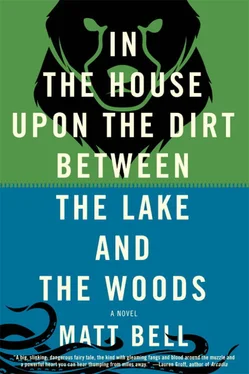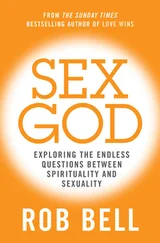And how sorely I was tempted, ready then to return to whatever waters, to linger in the naked dark with the black and inky salt around my ruined ankles, as I did after I first stood into the cold air, watching the squidness slip free of my body—but it was only by choosing the land that I could choose my wife, and so what other choice could I make, what else but to once more become a man.
4

THOSE DAMNED AND CLOCKLESS HOURS. Those unrecordable days, their tricky times, unable to be measured or even to have their passing discerned, and still some events did happen, still some progressions ran onward, unchecked and uncontrolled: Now the dirt crawled with flames, hot tongues licking that old star-glass, melting some into a form again slippery, still malleable and undetermined as I walked ashore, carrying the shape of a squid inside me, and also the many bodies of the fingerling, who I knew had neither forgiven me nor given up his vengeance. The rain continued to fall upon us as it had before, but no longer was there as much lightning and thunder in the air, and I wondered, How long had I been beneath the water, if that storm had passed, and how would I ever know?
In the distance—up the path from the lake, up the opened hill—there I saw the ruins of our house, barely rooms, barely chimney. The moonfall had cracked its foundations and cratered the rest, and I had to step lightly across our now-treacherous yard and our rubbled sitting room to find a sure path to traverse, some way to reach the center of the house, where our rooms now fell away into the earth. I crawled out toward the edge on my hands and knees, then looked downward from that precipice into the dirt, into the rooms and hallways exposed below. That first level was damaged too, its chambers cluttered with the house’s fallen furnishings, those dishes and furs and furniture, but from my vantage that sung floor still seemed more whole than the house I had built, and perhaps safe enough to enter, as I still planned.
From there I walked out of the house and then searched all around the cracked crater where the largest portions of the moon had fallen, but along its circumference I saw no good signs: On the lake side of the crater there was ink staining the soil and the water, and opposite that there was only the burned earth and ash-trees where the woods had farthest reached, and none of its animals were left where I could see them, if left at all. Occasionally I found the melted steel of some trap, and between its snapped jaws nothing remained, the fire having immolated what could not run, and no matter how many laps I made there was still no sign of the foundling, whom I had last sensed in the water, and there only faintly. Of all the elements of our world, it was mostly the woods that resisted the cooling of the falling rain, and there the clouds of ash and smoke and falling branches still thickened, so that all I could hear was the crackle of flames, the dropping of deadening limbs. Among the trees the sensed world shrunk, became some few feet of touch and taste, all dark, all ash, reddish-brown and brownish-red. There I called the foundling’s name, and then that confused air entered my lungs, made me hack and cough, put bright flecks across my vision, and still I tried to hold right the path toward my memory of the cave, a path straightened by fire and missing trees, by the removal of all the brush and thorny bramble that had thwarted my last attempt to find its entrance.
And still I was lost, still I could not find what I was looking for, until again the fingerling pointed the way, turned my steps toward what he must have somehow known we would find: the entrance to the cave, and then the foundling found again, just inside that smoke-filled hole; found trying to reach one mother or another by a path less-often taken, as if all caves led to the same chambers; found by stumbling over his stilled form, my feet tangling across his empty shape to send me sprawling.
Memory as discovery of this almost son of mine, of the body: To scramble back to standing, and then to return to my knees to dig the foundling’s shape from the cave floor, from what ash had already blanketed his form.
To uncover with my fingers the absence of breath, of speech or movement, and to put my hands to his chest, to push and pump and pry but to be able to add no breath or heartbeat, as he had so recently added mine to me.
To wipe away the silt and wonder again how long I had been gone, and where else the foundling had wandered before reaching the cave.
To taste what came out of his mouth and to find not life but ash and more silt, the gray stuff of his suffocation.
To cradle his body against mine and then to stand with his limp heaviness hung upon my frame.
To have forgotten the weight of a child and to regret the forgetting—but then to never forget what happened next, how it felt when my fingers discovered the wounds upon his back, the teeth marks splitting the skull, and to understand it was not the thicker air that killed the foundling but his mother the bear.
THE FIRE WAS MOSTLY EXTINGUISHEDby the time we emerged from the cave, although its effect remained in its additions of ash and char, and also its reductions, its destructions of leaf and needle, of fowl and flora. When I reached the tree line I saw the dirt was no less changed, the air warmer than before, and as I watched, a soft rain continued to fall in some places, although not in all. The weather—which had for so long been only one state—was not yet righted, and various kinds of precipitation fell upon me as I carried the foundling toward the crater’s edge, toward the cracked and broken house that hung above.
Between my steps aftershocks shook the ground, nearly rocked me from my feet, belied any delusions of safety I might have harbored now that the fire was gone, now that the sky’s ashy gradient moved quickly toward a more recognizable hue of gray. I advanced upon the ruins of the house, which despite its rearrangement remained mostly where I had built it: All my past steps were easily remembered, and those were the paths that led me home that day, with the foundling in my arms, the fingerling mad with happiness at his false brother’s new lack of everything, his body empty of all that life the fingerling had once begrudged.
All that remained was the shape my wife had given him, the body of a boy, the face that was my wife’s face, if she had been a boy herself, and how it wrenched me to look upon those features. My wife had sent the foundling into my care, and I had failed her, and for that I was sorry, and for that I would descend again the deep house so that I might reach the great stairs at its bottom, that deeper house that spiraled and soared below, and I tried to convince myself that this time I would walk those steps down into the black, through that last element and then beyond, into whatever deepest house was built there, the chamber in which my wife or else the body of my wife had so long been waiting.
THE WALLS ANGLED INWARD UPONtheir foundations, with only the brought brick of the chimney still mostly upright, and the rest of the house swayed, its creaking caught in the inconsistent gales that blew across the dirt. From there the path into the house was not the path I had previously taken but some other raised walkway left solid or nearly solid as the ground around it had crumbled, exposing the first levels of the deep house even as their rubble filled the empty rooms within, burying some number of the scorched stone floors. I did not look down more than I had to, and in any case the carried foundling made it hard to see where I placed my feet, and with each step the fingerling continued to cry, WHY BOTHER, WHY BOTHER, WHY BOTHER. Where before he’d had to swim from muscle to muscle, from gland to organ and back again, now his presence was persistent, his movements known everywhere always, as soft lumps between the thin bones of my hand, as more-fibered protuberances upon my femur and my clavicle. My stomach, his first home, swelled with him, so that when I pissed and shat his sign was there too, in thick dark blood, in veiny clods that dislodged only when I pushed and pushed. One of my eyes now failed intermittently, alternated cloudy and dark and starry and clear, and in this too I sensed his doing, just as I did in the ringing tinnitus of my ears and the crackle of my arthritis. Always now the fingerling made himself known, as perhaps I made myself known inside him, long ago, when I had inserted a fragment of myself into the egg, the vessel of his first long float, and if half the fingerling was made of some half of me, so now half of me was made of the same proportion of him, a weight balanced inside a weight.
Читать дальше













